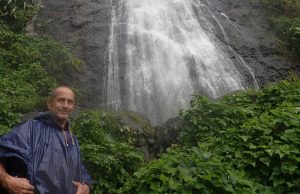Anthropology of Disasters: Managing Risks in the Indian Ocean

Grunewald in the interland of Réunion Island
François Grunewald (Groupe URD) reflects on his work on the anthropology of disasters.
Disasters have occurred frequently in the past in the small islands of the Indian Ocean as well as in the mega-island of the region, Madagascar.
But both patterns of events and patterns of exposures have changed dramatically over recent decades. Rapid urbanization of the littorals with the development industries and touristic activities, degradation of the mountainous and forested ecosystems in the central volcanic highlands, progressive disappearance of coral reefs and mangroves as well as political conflict (Comoros Islands, Madagascar) and the impact of climate changes are modifying the “risk landscape” at a faster rate than local people can remember. There is, then a disconnection between indigenous and traditional risk understanding and management and the new situation.
Groupe URD is joining hands with the French Red Cross’s PIROI initiative (the Indian Ocean Regional Intervention Platform) to explore how a scientific approach to the anthropology of disaster can help the design of modern risk management policies. This will involve the deployment of social scientists to explore, with the older segment of the population, the wide area of beliefs, visions, cosmogony in relation to natural hazards – such as volcanic phenomenon in La Réunion and Comoros Islands – as well as extreme climate events. Other examples are the dynamics of drought and locust infestation in Madagascar which can be analysed both through the lens of traditional narrative and practice and through modern technologies.
In all cases, information will be augmented by whatever is available from aerial surveillance or satellite imagery. Then they will be put in the perspectives of changes in population density, land occupancy, new dynamics in climate extremes, etc. The results of this “conversation” between the past and the current period will be key to identify how to design prevention messages and risk education strategies. They will be used to inform the current programmes of risk awareness of the Red Cross and Red Crescent system, including the famous para pa pare programme (“ready or not ready” in Creole).
Groupe URD welcomes opportunities to work with PaCCS researchers on this topic. There may be facets of our work in the Indian Ocean that would connect with the latest call for research into Conflict and International Development. For instance, the Comoros has been described as “the most coup-wracked country in the world”, having suffered twenty military assaults on its government since independence in 1975 (Source). Madagascar itself has been and still is too frequently a land of political turmoil, in addition to being an areas where conflicts over land rights are daily and often deadly.
—
François Grunewald is Executive Director of Groupe URD, a not-for-profit institute for research and evaluation working in the humanitarian and post-crisis sectors. He is an agricultural engineer with extensive experience of working on emergency food security programmes. He supervises all of Groupe URD’s research and evaluation work. He co-edits Pratiques Humanitaires and is a former member of the Haut Conseil de la Coopération Internationale and of the Commission Nationale Consultative des Droits de l’Homme.



